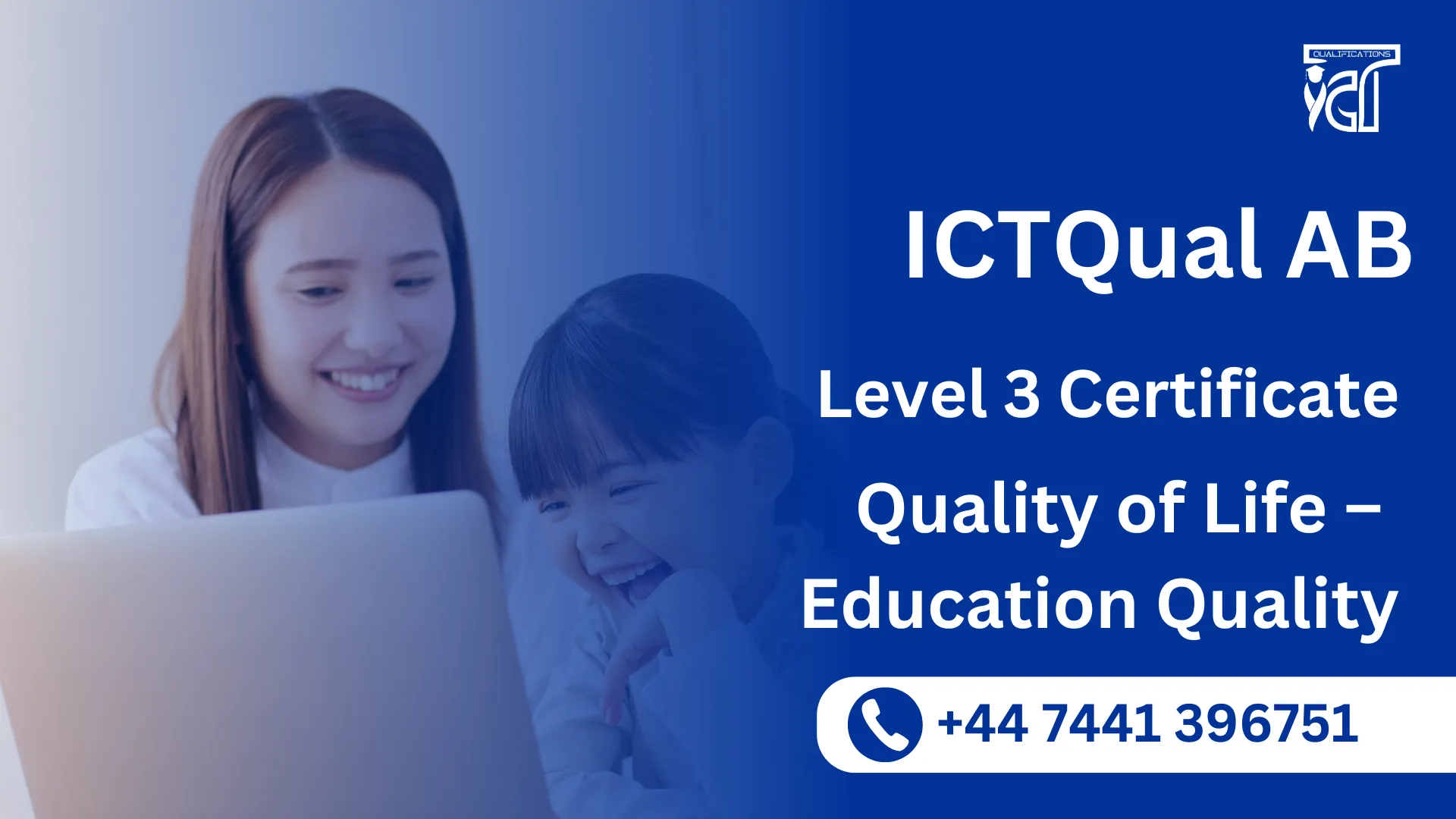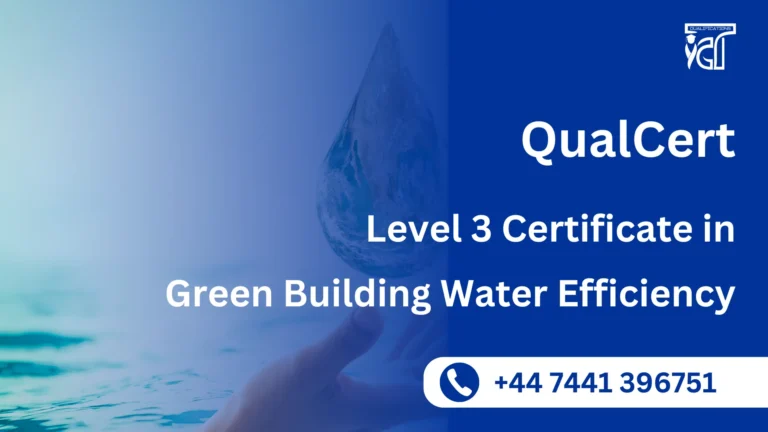The ICTQual AB Level 3 Certificate in Quality of Life – Education Quality is designed to explore the vital role that education plays in shaping individual well-being, social development, and long-term opportunities. Education is not only a pathway to knowledge but also a cornerstone of quality of life, influencing employment prospects, social mobility, and personal growth. This course provides learners with a structured understanding of how education systems, policies, and practices contribute to the overall quality of life in communities and societies.
Learners will examine the relationship between education quality and key indicators of life outcomes, such as economic stability, health awareness, civic participation, and cultural enrichment. The program emphasizes both global and local perspectives, allowing participants to understand how education standards vary across regions and how these differences impact social equity and development. Through case studies and applied learning, learners will gain insights into the challenges of ensuring equitable access to quality education and the strategies used to overcome them.
A central focus of the course is the evaluation of education systems and the identification of factors that enhance or hinder their effectiveness. Learners will explore topics such as curriculum design, teaching methodologies, resource allocation, and policy frameworks, while also considering the role of technology and innovation in improving education quality. By analyzing these elements, participants will develop the ability to assess educational environments critically and propose solutions that support inclusivity, sustainability, and lifelong learning.
Ultimately, this qualification equips learners with the knowledge to understand education as a driver of quality of life and social progress. It prepares them to contribute meaningfully to discussions and initiatives aimed at improving education standards, whether in professional, academic, or community contexts. By completing this course, participants will not only enhance their understanding of education quality but also gain the confidence to advocate for systems that empower individuals and strengthen societies.
ICTQual AB Level 3 Certificate in Quality of Life – Education Quality
This qualification, the ICTQual AB Level 3 Certificate in Quality of Life – Education Quality, consists of 3 mandatory units.
| Sr# | Unit Title |
| 1 | Foundations of Education Quality and Quality of Life |
| 2 | Teaching Standards, Curriculum, and Inclusive Learning |
| 3 | Education Systems, Equity, and Social Development |
Learning Outcomes for the ICTQual AB Level 3 Certificate in Quality of Life – Education Quality:
Foundations of Education Quality and Quality of Life
By the end of this unit, learners will be able to:
- Define the concept of education quality and explain its relationship to quality of life.
- Analyse how access to quality education influences personal and community wellbeing.
- Identify key indicators used to measure education quality across different contexts.
- Evaluate the role of teachers, learners, and institutions in shaping education outcomes.
- Demonstrate understanding of global perspectives on education quality.
- Reflect on the importance of inclusive and equitable education for sustainable development.
- Apply theoretical frameworks to assess the impact of education on social mobility.
- Compare education quality standards across different systems and regions.
- Develop critical thinking skills to link education quality with lifelong learning.
Teaching Standards, Curriculum, and Inclusive Learning
By the end of this unit, learners will be able to:
- Explain the role of teaching standards in ensuring effective learning outcomes.
- Analyse how curriculum design influences learner engagement and achievement.
- Evaluate the importance of inclusive learning practices in diverse classrooms.
- Demonstrate awareness of strategies for supporting learners with different needs.
- Reflect on the ethical responsibilities of teachers in promoting equity and fairness.
- Apply knowledge of curriculum frameworks to real‑world educational contexts.
- Identify challenges and opportunities in implementing inclusive education.
- Propose strategies for improving teaching quality and curriculum relevance.
- Develop communication skills for fostering inclusive and supportive learning environments.
Education Systems, Equity, and Social Development
By the end of this unit, learners will be able to:
- Demonstrate understanding of how education systems are structured and governed.
- Analyse the relationship between education equity and social development.
- Evaluate the role of policy and governance in shaping education quality.
- Reflect on the importance of equal access to education for reducing inequality.
- Apply knowledge of education systems to case studies on social mobility.
- Identify barriers to equitable education and propose solutions.
- Demonstrate awareness of international frameworks supporting education for all.
- Develop problem‑solving skills to address issues of inequality in education.
- Propose initiatives that integrate education quality with sustainable community development.
Education is one of the most powerful drivers of personal growth, social development, and overall quality of life. The ICTQual AB Level 3 Certificate in Quality of Life – Education Quality equips learners with the knowledge and skills to understand how education systems, policies, and practices influence well-being, equity, and opportunity. This program highlights the importance of accessible, high-quality education in shaping communities and empowering individuals.
1. Strengthened Understanding of Education and Quality of Life
- Gain insights into how education impacts social mobility, employment, health awareness, and civic participation.
- Understand the link between education quality and long-term life outcomes.
- Explore global and local perspectives on education standards and equity.
- Learn how education contributes to sustainable development and social progress.
2. Enhanced Analytical and Evaluation Skills
- Develop the ability to critically assess education systems and policies.
- Learn to identify strengths and weaknesses in curriculum design and teaching methods.
- Acquire skills to evaluate resource allocation and its impact on learning outcomes.
- Strengthen problem-solving abilities by proposing solutions to improve education quality.
3. Improved Awareness of Equity and Inclusivity
- Understand challenges related to access, equity, and inclusivity in education.
- Explore strategies to overcome barriers faced by marginalized groups.
- Gain knowledge of how technology and innovation can support inclusive learning.
- Learn to advocate for fair and sustainable education practices.
4. Career and Professional Development Opportunities
- Position yourself for roles in education management, policy analysis, or community development.
- Enhance employability by gaining expertise in evaluating and improving education quality.
- Acquire transferable skills applicable across academic, social, and professional contexts.
- Contribute meaningfully to initiatives that strengthen education systems and improve quality of life.
The ICTQual AB Level 3 Certificate in Quality of Life – Education Quality is designed for individuals who want to understand how education systems, policies, and practices influence overall well-being and social development. Ideal learners are those who seek to connect the principles of education quality with broader life outcomes, including equity, opportunity, and sustainability.
1. Learners Interested in Education and Social Development
- Individuals who want to explore how education impacts quality of life and community growth.
- Those motivated to understand the role of education in shaping employment, health, and civic participation.
- Learners who value education as a tool for empowerment and social mobility.
2. Learners Focused on Analytical and Evaluation Skills
- Candidates who enjoy critically assessing education systems, policies, and teaching practices.
- Those interested in identifying strengths and weaknesses in curriculum design and resource allocation.
- Learners who want to develop problem-solving skills to propose improvements in education quality.
3. Learners Committed to Equity and Inclusivity
- Individuals passionate about addressing barriers to education for marginalized groups.
- Those who want to explore strategies for inclusive and sustainable learning environments.
- Learners motivated to advocate for fair access to quality education globally and locally.
4. Learners Seeking Career and Professional Growth
- Early-career professionals aiming to enter education management, policy analysis, or community development.
- Experienced practitioners who want to expand their expertise in evaluating and improving education quality.
- Career changers seeking transferable skills applicable across academic, social, and professional contexts.
- Learners who aspire to contribute to initiatives that strengthen education systems and enhance quality of life.
The ICTQual AB Level 3 Certificate in Quality of Life – Education Quality provides learners with a strong foundation to explore advanced qualifications and professional opportunities in education, quality assurance, and social development. This course acts as a stepping stone for those who wish to deepen their expertise in how education systems influence well-being and societal progress.
1. Progression to Higher-Level Diplomas and Certifications
- Advance to Level 4 and Level 5 Diplomas in Education Quality or Social Development.
- Pursue specialized certifications in Education Management, Policy Analysis, or Quality Assurance in Education.
- Explore international programs such as ISO Education Standards or UNESCO-aligned training.
- Strengthen global employability through internationally recognized qualifications.
2. Career Development Opportunities
- Move into roles such as Education Quality Officer or Community Development Coordinator.
- Progress into supervisory or managerial positions within schools, NGOs, or government agencies.
- Apply skills in industries and organizations focused on education and social equity.
- Enhance employability by demonstrating expertise in evaluating and improving education quality.
3. Academic and Professional Pathways
- Use this qualification as a foundation for advanced study in education, social sciences, or public policy.
- Pursue higher-level diplomas or professional memberships in education-focused organizations.
- Apply transferable skills in international contexts and global education initiatives.
- Build credibility for roles in policy-making and education reform.
4. Long-Term Growth and Specialization
- Specialize in areas such as Inclusive Education, Curriculum Development, or Education Policy Reform.
- Contribute to consultancy roles advising institutions on education quality.
- Prepare for leadership positions in organizations where education drives quality of life.
Entry Requirements
Learners must meet the following criteria to be considered for admission into the course:
- Age Requirement: Learners must typically be 18 years of age or older at the time of enrolment
- Educational Background: Completion of secondary school education or equivalent qualification. Prior Level 2 qualifications in social sciences, education, or related fields are helpful but not mandatory.
- Work Experience: While formal work experience is not mandatory, 6–12 months of exposure to education, training, or community development environments is highly beneficial. Relevant experience may include roles in teaching support, administrative duties in schools, NGO projects, or community-based learning initiatives.
- English Language Proficiency: Competence in English or the language of instruction is required to engage with course materials and assessments. Recommended proficiency at CEFR A2–B1 level or equivalent, covering both written and spoken communication.
Register Now
Qualification Process
Qualification Process for the ICTQual AB Level 3 Certificate in Quality of Life – Education Quality
- Self-Assessment:
Begin by evaluating your eligibility to ensure you meet the qualification requirements, including work experience, knowledge, and language proficiency. - Registration:
Complete your registration by submitting the required documents, including a scanned copy of a valid ID, and paying the registration fee. - Induction:
An assessor will conduct an induction to confirm your eligibility for the course and explain the evidence requirements. If you do not meet the criteria, your registration will be cancelled, and the fee will be refunded. - Assignments & Evidence Submission:
Provide all assignments and the necessary evidence based on the assessment criteria outlined in the course. If you are unsure of the required evidence, consult with the assessor for guidance on the type and nature of evidence needed. - Feedback and Revision:
The assessor will review your submitted evidence and provide feedback. Evidence that meets the criteria will be marked as “Criteria Met,” while any gaps will be identified. You will be asked to revise and resubmit if needed. - Competence Evidence:
Submit final evidence demonstrating that all learning outcomes have been met. This evidence will be marked as “Criteria Met” by the assessor once it is satisfactory. - Internal Quality Assurance (IQA):
The Internal Quality Assurance Verifier (IQA) will review your evidence to ensure consistency, quality, and compliance with standards. - External Verification:
The IQA will submit your portfolio to ICTQUAL AB External Quality Assurance Verifiers (EQA) for final confirmation. The EQA may contact you directly to verify the authenticity of your evidence. - Certification:
Upon successful completion of all checks, ICTQUAL AB will issue your official certificate, confirming that you have attained the ICTQual AB Level 3 Certificate in Quality of Life – Education Quality.







